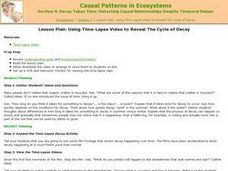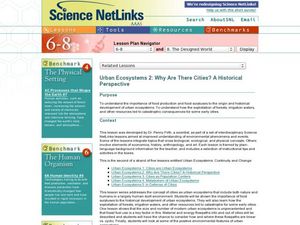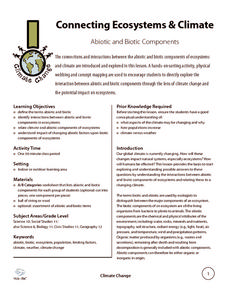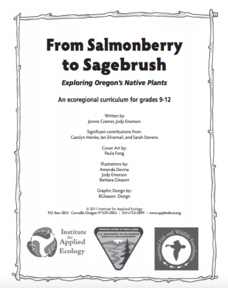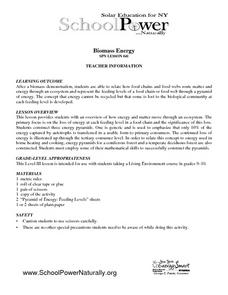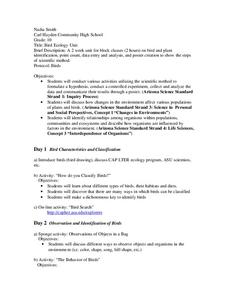Pennsylvania Department of Education
Animal Classes and Their Ecosystems
Students explore animal characteristics by participating in an environment identification activity. In this animal habitat lesson, students discuss a range of different wild life and the ecosystems that they are a part of. Students view...
Curated OER
Activity 1: Please Pass the Energy, Food Webs in the Upper Ocean and Hydrothermal Vent Communities
Students create food webs for two different ocean communities. They are given cards showing organisms from the surface of the ocean. They arrange them in order of who eats whom. After this class activity, students create a food web for...
Curated OER
LEAF (Learning Exercises and Activities in the Forest
Students observe populations and determine the functions (e.g., decomposers, producers, consumers) they serve in an ecosystem. They investigate the energy flow ecosystems. Students investigate factors (.g., Resources, light, water) that...
Curated OER
Aquatic Ecosystems
Students study the diversity of marine life and their habitats. For this aquatic ecosystems lesson students complete a lab activity and experiment.
Foundation for Water & Energy Education
How Can a Dam Affect a River? Activity B
Second in a pair of activities, young ecologists continue to examine the food pyramid of a freshwater ecosystem. They take a look at the food pyramid drawn in Activity A and consider what would happen if a reservoir was created on the...
Curated OER
Casual Patterns in Ecosystems
Ecology explorers or beginning biologists view a time-lapse film of decaying strawberries. They discuss how decomposition occurs and what factors might affect the rate of decay. Alone, the lesson plan is lacking engaging attributes....
Curated OER
Urban Ecosystems 2: Why Are There Cities? A Historical Perspective
Students investigate the importance of food surpluses to the historical development of urban ecosystems.
Wild BC
Connecting Ecosystems & Climate
Collaborators sort a set of cards into biotic and abiotic categories. Then, as a class, they discuss their work and relate each of the abiotic components to climate change. Finally, they form a web of components by connecting those that...
Institute for Applied Ecology
From Salmonberry to Sagebrush - Exploring Oregon’s Native Plants
Take a deep dive into Oregon's ecosystems, plants, and changes from the past to the future. Many hands-on activities in an environmental science unit delight scholars, including creating a field guide for a local park. The in-depth study...
Illinois Department of Natural Resources
Section One: What is Biodiversity?
Four intriguing and scientific activities invite learners to explore the natural resources of their town. The activities cover concepts such as genetic traits, organizing species in a taxonomy, the differences between different species...
PBS
All Tangled Up
It is a tangled web the ecosystem weaves. Learners begin an activity on ecosystem interactions by building a food chain and then a food web with yarn as a group. To finish, they research local environmental changes that may impact the...
University of Florida
A Walk in the Woods
Take class members on a field trip to the forest without leaving the classroom. Scholars learn content-related vocabulary and factors affecting forest health with class discussions and during a presentation. Scientists combine forestry...
National Wildlife Federation
Habitat Web
It's all connected. Classes create a web to connect living things in a local ecosystem. They create cards with both living and nonliving things found in their areas while considering the characteristics of each. After they have a good...
Alabama Wildlife Federation
Forest Floor Investigation
Most living things go unnoticed. Change that using a fun activity about the nutrient cycle. Pupils use hula hoops to mark areas of study and then make observations about the living things they see. They first make surface observations,...
Curated OER
Ecosystem Concept Map
How do ecosystems change? How do organisms keep their ecosystem going? Learners use a word bank to fill in 12 blanks that describe the functionality of ecosystems.
Michigan State University
Bug Lyphe!
Introduce ecology classes to biodiversity and interdependence in ecosystems with a PowerPoint presentation. Then, they get up-close and personal with the invertebrate world by collecting insects, classifying them, and graphing their...
Curated OER
That's Predictable - Stream Side Science
Research the impact that changes in biotic or abiotic factors might have on an ecosystem. Debate for or against the changes and take action in the community. This resource ideally follows stream studies that young ecologists may have...
Curated OER
Speedy Succession
Fifth graders identify how a pond can change into a grassland. An ecosystems lesson where learners identify pioneer and climax species, and recognize that ecological succession can take up to 100 years or more. Some excellent activities...
Curated OER
Biomass Energy
Junior ecologists relate how food chains and food webs route matter and energy through an ecosystem. They trace feeding levels of a food chain or food web through a pyramid of energy. As a reinforcement activity, learners construct three...
Curated OER
Bird Ecology Unit
Tenth graders conduct various activities utilizing the scientific method to formulate a hypothesis, conduct a controlled experiment, collect and analyze the data and communicate their results through a poster. They also identify...
Curated OER
Design a Reef!
Using a miniature coral reef aquarium kit, young ecologists model this unique ecosystem. They research various coral reef organisms and their niches, and they culminate the project by working together to write a report. Use this activity...
National Park Service
Subalpine Web
The theory of keystone species in an ecosystem was first established in 1969 by Robert T. Paine. Pupils open the final lesson in a five-part series with a game guessing which member of the alpine ecosystem they are based on clues. After...
Curated OER
Erosion
Fifth graders engage in some activities that will help them to identify erosion and explain the causes of erosion. They also look into ways that humans can slow the process of erosion in some cases. After a teacher-led demonstration,...
Curated OER
If the Forests Could TAlk
Third graders research insects using the internet sites provided. They research the role of insects as pollinators for plants, and the impact they have on our ecosystem. They participate in various activities/centers utilizing the facts...





